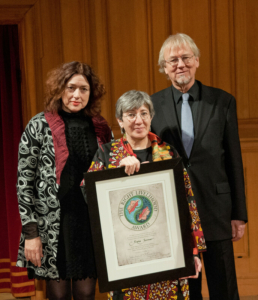2012 haben wir Sima Samar den Right Livelihood Award („Alternativen Nobelpreis“) verliehen, weil ihr Kampf für Menschenrechte und speziell für die Rechte von Frauen uns sehr beeindruckt hat. Afghanistan ist ein Land mit vielen Unterschieden zwischen Stadt und Land, zwischen den Volksgruppen, und über Jahrzehnte geprägt von wechselnden internationalen Einsätzen. Hier seine Stimme zu erheben, ist mutig und vorbildlich. Das gilt mehr denn je jetzt, wo die ausländischen Truppen das Land überhastet verlassen und den Taliban überlassen haben.
Sima Samar war Anfang Februar im europäischen Parlament bei den „Afghan Women Days“ zu Gast. Die beeindruckende Rede gebe ich hier gern wieder:
„Excellences, Ladies and Gentlemen:
First of all, I would like to thank the EU for organizing this program in honor of the women in my country. The women in Afghanistan are brave and strong. We witnessed the killing of our loved ones, destruction of our property and our social fabric, forced displacement and the degradation of our position in society during the past 44 years of conflicts. However, we still stand for our rights and freedom and struggle to protect our human dignity in most difficult circumstances, the prove for this is the protest of the young women in Afghanistan.
Madam Chair:
You have all heard and watched the scary scenes in Afghanistan in the media and social media, but the situation is so much worse than what you see. Most of the time I cannot find words to describe it. Imagine the level of desperation to sell your children or your organ such as kidney to feed the rest of the family. I would to touch on some issues;
COLLECTIVE FAILURE OF AFGHAN GOVERNMENT
1- Afghanistan is a collective failure of Afghan government, Afghan people and the international community. It has been a failure of accountability, rule of law, and commitment to human rights. We warned that the international community abandoned Afghanistan again as they did after the Soviet withdrawal that tragedy would repeat itself, and it has.
2- Twenty years of the international community engagement gave some space for improvement of human rights, women’s rights and space to exercise basic democratic political rights in Afghanistan. It was first time that almost all of the superpowers were united on the issue in Afghanistan. However, these advancements for women’s rights and human rights were sacrificed for political advantech in Afghanistan and abroad.
3- History has shown that when you want to destroy a nation you just take three actions. First, you make half of the population inferior and second class citizens. In this way, you start the mentality of male superiority and that women are inferior in the family, which then transfers to the whole society including at the political leadership level. This is what has been done in Afghanistan. The presence and participation of women, currently is the biggest problem of the country. The fighters forget that all of their “heroes” are born of their mothers.
4- Second, you destroy the education system in the country. People who want to control the population deny quality education for the people in all levels. They are saying that universities are more dangerous than the bombs. We watch this in my country, and the use of Takferi policy, which uses religion as tool to silence the people and controls them although Islam started with IQRA to read for everyone, not only for men. There is a famous saying that if you educate a man you educate a person; if you educate a woman, you educate a family and you educate a society. An uneducated population is easy to control, which is why they fear educated women and an educated population.
5- The third action to destroy a nation is to devalue the values and principles of human rights and equality. When their no respect for human rights and rule of law, then violations of human rights and discrimination based on gender, ethnicity, color, language and religion become the norm. In this way, the rule of jungle is enforced. Accountability and justice are ignored and become a luxury for the people, which they cannot afford.
6- We have seen all these three destructive factors in my country. For over more than four decades’ people in my country have been caught between the extreme left and extreme right. All sides have been involved in this destruction in Afghanistan. Currently, the people who are in power, in practice are ignoring Afghanistan’s obligations to the human rights conventions that were ratified by the state. They have closed the Afghanistan Independent Women’s Rights Commission and replaced the Ministry of Women’s Affairs with the Ministry of Vice and Virtue. There is no place for people, especially women, to find support for their rights, and seek justice.
7 – The humanitarian crisis in Afghanistan is horrendous. Many have been displaced. People cannot find food or shelter. Most have no income and jobs and trying to sell their belonging including their daughters. There is crowding to get passports and at the borders to our neighboring countries. These are just some of the signs of people’s desperation and their lack of trust in the current political system.
Ladies and Gentleman; My recommendations:
RECOMMENDATIONS TO THE TALIBAN
First, to Taliban:
a. They have to accept that taking power by military action does not mean that they are legitimate government. If they really want to end the war and killing of more people in Afghanistan, they have to go for inclusive government and allow people’s participation in the political structure. Existing of women’s groups and civil society, including freedom of media and expressions can add to legitimacy.
b. The Taliban also has to accept that Afghanistan is not made up of one ethnic or political group. The beauty of Afghanistan is the multi-ethnicity of the country. They must support equality for everyone who lives in the country. Symbolic actions will not convince the people to trust them.
c. The other fact is that whether they like it or not women are half of the population in Afghanistan. They must have all the rights and freedom as human beings. Denial of the fact is not changing the reality that half of the human force are women.
d. Importantly, they have to learn the lessons from the previous governments in Afghanistan. They cannot enforce their mentality on the people. When they do not have the support of the people, they will not be successful. Legitimacy comes from people’s participation for their future. They should know that they will not achieve stability, security, sustainable peace and development without full participation of women in all level.
e. The Taliban has the responsibility to provide a safe environment for humanitarian and relief program and equal distribution without discrimination. Special attention should be paid to vulnerable groups, such women, people with disability, IDPs and minorities.
f. The accountability and provision of justice is a strong pillar of Islam. They have not taken any action on this regards. The people in Afghanistan have the right to justice. I am not promoting revenge, but proper mechanisms to provide justice to the victims of the conflicts are needed.
Second, to the International Community and the UN:
RECOMMENDATIONS TO THE UN
a- The international community has the moral obligation to support people-in-need no matter where they are. They have to be transparent in distribution of relief programs to the people through UN and local NGOs based on the principle of IHL. No tolerance should be allowed for corruption or discrimination.
b- Women should be involved at every level of the relief program, from planning, to those distributing, and receiving the relief, including to the monitoring of the program.
c- Human rights values and principles should not be negotiated away under any circumstances. Respect for culture and religion should not be used as an excuse to allow violations of the human rights of women and deny them to exercise their rights and freedom including access to aid.
d- Accountability and justice should be part of the agenda pressed with the Taliban. One of the reasons for our collective failure is lack of attention to the issue of accountability and justice for international crimes, which has promoted a culture of impunity to all the sides of the conflict not only in Afghanistan but also in other parts of the world.
e- The international community should not only treat the symptoms of our wounds, but we need to eradicate the bacteria for the wounds to heal. Otherwise, we face what we witness in Afghanistan. Unfortunately, the wounds are much deeper in my country to heal with superficial dressing.
f- We all need to remind ourselves that the problem in Afghanistan will not stay in our boundaries. History has shown us this. We need to learn lessons from the failure and the suffering of the people in Afghanistan.
g- Access to quality education and health services including access to reproductive health is a basic human rights and should not be denied under any circumstances.
h- Finally, I propose a human rights-based approach to every engagement in Afghanistan to reach our goals to protect the human dignity and achieved SDG goals. Protection of HRDs, journalist and civil society should be the important part of the goals. The silence in the grave yards cannot justify peaceful society.
Third, to our neighboring countries:
RECOMMENDATIONS TO AFGHANISTAN’S NEIGHBOR COUNTRIES
We cannot choose our neighbors. We must stop interfering in each other’s countries. We all need to acknowledge the existing problems, and honestly try to find a solution. Denying reality will not change the facts on the ground. Let’s be honest and try to treat the bleeding wounds in Afghanistan, so none of us will suffer from anemia. The fact is that the fire you put in our country will catch in yours as well, sooner or later.
In conclusion, unfortunately the problem in Afghanistan is chronic. It requires long-term multi-dimension strategies based on human rights values and principles. We need to stop the blame game for this collective failure, provide honest assessment, and take a coordinated approach to learn the lessons from our mistakes. The people, and particularly the victims of conflict in Afghanistan, should have the right to the truth and access to justice. Let’s stand united to promote human rights to save our dignity.
Let me end my talks by saying that I participated 24 years ago in a program with Emma Bonino, A Flower for Women in Afghanistan. Once again, I am participating in Afghan Women Days, in the same institution.
Unfortunately, the history repeats itself in my country.
Thank you.“
Link zur Ankündigung der „Afghan Women Days“ im Europäischen Parlament
Link zum Porträt von Simar Samar auf der Seite der „Right Livielihood Award“-Stiftung

 Monika Griefahn GmbH
Monika Griefahn GmbH
Schreiben Sie einen Kommentar